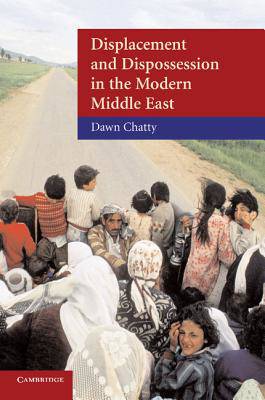
Door een staking bij bpost kan je online bestelling op dit moment iets langer onderweg zijn dan voorzien. Dringend iets nodig? Onze winkels ontvangen jou met open armen!
- Afhalen na 1 uur in een winkel met voorraad
- Gratis thuislevering in België vanaf € 30
- Ruim aanbod met 7 miljoen producten
Door een staking bij bpost kan je online bestelling op dit moment iets langer onderweg zijn dan voorzien. Dringend iets nodig? Onze winkels ontvangen jou met open armen!
- Afhalen na 1 uur in een winkel met voorraad
- Gratis thuislevering in België vanaf € 30
- Ruim aanbod met 7 miljoen producten
Zoeken
Omschrijving
Dispossession and forced migration in the Middle East remain even today significant elements of contemporary life in the region. Dawn Chatty's book traces the history of those who, as a reconstructed Middle East emerged at the beginning of the twentieth century, found themselves cut off from their homelands, refugees in a new world, with borders created out of the ashes of war and the fall of the Ottoman Empire. As an anthropologist, the author is particularly sensitive to individual experience and how these experiences have impacted on society as a whole from the political, social, and environmental perspectives. Through personal stories and interviews within different communities, she shows how some minorities, such as the Armenian and Circassian communities, have succeeded in integrating and creating new identities, whereas others, such as the Palestinians and the Kurds, have been left homeless within impermanent landscapes. The book is unusual in combining an ethnographic approach that analyzes the everyday experiences of refugees and migrants against the backdrop of the broad sweep of Mediterranean history. It is intended as an introduction for students in Middle East studies, history, political science, and anthropology and for anyone concerned with war and conflict in the region.
Specificaties
Betrokkenen
- Auteur(s):
- Uitgeverij:
Inhoud
- Aantal bladzijden:
- 350
- Taal:
- Engels
- Reeks:
- Reeksnummer:
- nr. 5
Eigenschappen
- Productcode (EAN):
- 9780521521048
- Verschijningsdatum:
- 8/03/2010
- Uitvoering:
- Paperback
- Formaat:
- Trade paperback (VS)
- Afmetingen:
- 152 mm x 226 mm
- Gewicht:
- 476 g

Alleen bij Standaard Boekhandel
+ 97 punten op je klantenkaart van Standaard Boekhandel
Beoordelingen
We publiceren alleen reviews die voldoen aan de voorwaarden voor reviews. Bekijk onze voorwaarden voor reviews.











